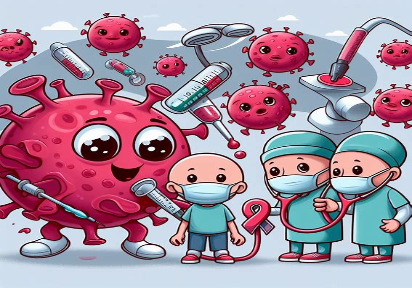Written by Lisa Mulcahy, May 31, 2023 – WebMD
Once you test negative after a bout with COVID-19, it’s a great idea to get a full health screening. This is especially important for people who are at risk for, or have, blood cancers like leukemia.
If you have blood cancer, you need to have a clear picture of how strong your immune system is – which is extra important if you have any symptoms of long COVID, experts say. That’s because most leukemia treatments lead to some type of immunocompromise, meaning these patients have weakened immune systems and therefore have trouble fighting infections they have at the same time.
Several studies have also found a potential link between COVID and leukemia, based on patients having the disease shortly after having COVID.
The Basics: Leukemia Symptoms and Treatments
Who is most at risk for leukemia, and what are some common ways doctors detect and treat this type of blood cancer?
A study from researchers at Mount Sinai Hospital in New York City, along with Universidade Estadual do Maranhão, Centro Universitário Christus, and Universidade Federal do Ceará in Brazil, described how, after recovering from COVID, previously healthy young adults were diagnosed, respectively, with acute myeloid leukemia, T-cell acute lymphoblastic leukemia and myelodysplastic syndrome, which turns into acute myeloid leukemia about 50% of the time.
And Iranian research reported on a patient who was diagnosed with acute myeloid leukemia about 40 days post-COVID, having a severe drop in hemoglobin and platelets. Another study looked at the chance that COVID can increase the odds of the development of hairy cell leukemia.It’s important to note that these cases were not widespread. But the authors of these studies have recommended further research to see if a conclusive, known link between COVID and a later blood cancer diagnosis can be established.
“While significantly more research is needed to show a conclusive link between the two, data have shown the negative effects of a COVID-19 infection in patients with a blood cancer,” said Lee Greenberger, PhD, the chief scientific officer at the Leukemia and Lymphoma Society. “What we do know for sure is that COVID-19 infection can be quite dangerous for people who have blood cancer, particularly those with B-cell depleting forms of cancer. We need to stay focused on helping them avoid infection and its serious outcomes.”
What Are the Symptoms of Leukemia?
Leukemia, which is cancer of the tissues that form blood in your body, including your bone marrow and lymphatic system, can occur, as we’ve seen, in a number of types. Because of this, its symptoms can vary. Symptoms can include:
- Chills or fever
- Weight loss without trying
- Swollen lymph nodes
- Fatigue that doesn’t go away
- Bleeding or bruising easily
- Night sweats
- Tiny red spots on your skin
- Your bones feeling tender or painful
What Are the Risk Factors for Leukemia?
People have a higher chance of getting leukemia if they:
- Have a family history of the disease
- Are a smoker
- Have had previous cancer treatment, such as chemo or radiation
- Have a genetic disorder such as Down syndrome
- Have been exposed to chemicals at work like benzene and formaldehyde
How Could COVID-19 Cause Leukemia?
One potential way is that COVID may cause hematological changes in the weeks after infection that can reduce cellular immunity in some patients. The authors of the Mount Sinai/Brazilian hospitals study believe there is a chance that COVID may cause an abnormal immune response in the body that could trigger the cell mutations that cause leukemia.
But no cause has been definitively found to explain a connection.
“There could be various hypothesized mechanisms that one could propose to suggest why and how COVID might ultimately lead to blood cancer,” said Oscar B. Lahoud, MD, a bone marrow transplant and cellular therapy specialist at Memorial Sloan Kettering Cancer Center in New York City. “It could be through various immune system stimulations, and rapid proliferation leading to mutagenesis [the process by which DNA changes, resulting in a gene mutation], but these mechanisms are not substantiated by any documented experimental data.”
